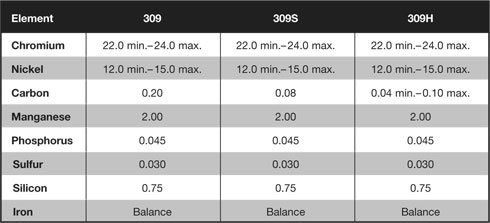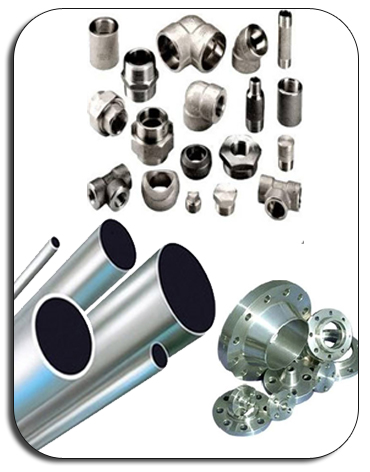Special Products
SS 309
General Properties
SS 309 is an austenitic stainless steel developed for use in high temperature corrosion resistance applications. The alloy resists oxidation up to 1900°F (1038°C) under non-cyclic conditions. Frequent thermal cycling reduces oxidation resistance to approximately 1850°F (1010°C).
Because of its high chromium and low nickel content, SS 309 can be utilized in sulfur containing atmospheres up to 1832°F (1000°C). The alloy is not recommended for use in highly carburizing atmospheres since it exhibits only moderate resistance to carbon absorption. SS 309 can be utilized in slightly oxidizing, nitriding, cementing and thermal cycling applications, albeit, the maximum service temperature must be reduced.
When heated between 1202 – 1742°F (650 – 950°C) the alloy is subject to sigma phase precipitation. A solution annealing treatment at 2012 – 2102°F (1100 – 1150°C) will restore a degree of toughness.
SS 309 can be easily welded and processed by standard shop fabrication practices.
Applications
- Furnaces — burners, doors, fans, piping and recuperators
- Fluidized Bed Furnaces — grids, piping, wind boxes
- Paper Mill Equipment
- Petroleum Refining — catalytic recovery systems, recuperators
- Power Generation — pulverized coal burners, tube hangers
- Thermal Processing — annealing covers and boxes, burners grids, doors, fans, lead pans and neutral salt pots, muffles and retorts, recuperators, walking beams
- Waste Treatment — incinerators, rotary kilns and calciners
Chemical Analysis
Weight % (all values are maximum unless a range is otherwise indicated)
Physical Properties
| Density 0.285 lbs/in3 7.89 g/cm3 |
Specific Heat 0.12 BTU/lb-°F (32 – 212°F) 502 J/kg-°K (0 – 100°C) |
|
|
Thermal Conductivity 212°F (100°C) 9.0 BTU/hr/ft2/ft/°F 15.6 W/m-°K |
|
Melting Range 2500 – 2590°F 1480 – 1530°C |
Electrical Resistivity 30.7 Microhm-in at 68°C 78 Microhm-cm at 20°C |
Mechanical Properties
Typicals Values at 68°F (20°C)
Corrosion Resistance
Wet CorrosionSS 309 is not designed for service in wet corrosive environments. The high carbon content, which is present to enhance creep properties, has a detrimental effect on aqueous corrosion resistance. The alloy is prone to intergranular corrosion after long term exposure at high temperatures. However, due to its high chromium content (23%), SS 309 is more corrosion resistant than most heat resistant alloys.
High Temperature Corrosion
SS 309 resists high temperature corrosion in most in-service conditions. Operating temperatures are as follows:
Oxidizing conditions (max. sulfur content – 2 g/m3)
1922°F (1050°C) continuous service
2012°F (1100°C) peak temperature
Oxidizing conditions (max. sulfur greater than 2 g/m3)
1742°F (950°C) maximum temperature
Low oxygen atmosphere (max. sulfur content – 2 g/m3)
1832°F (1000°C) maximum temperature
Nitriding or carburizing atmospheres
1562 –1742°F (850 – 950°C) maximum
The alloy does not perform as well as Alloy Steel 600 (UNS N06600) or Alloy Steel 800 (UNS N08800) in reducing, nitriding or carburizing atmospheres, but it does outperform most heat resistant stainless steels in these conditions.
